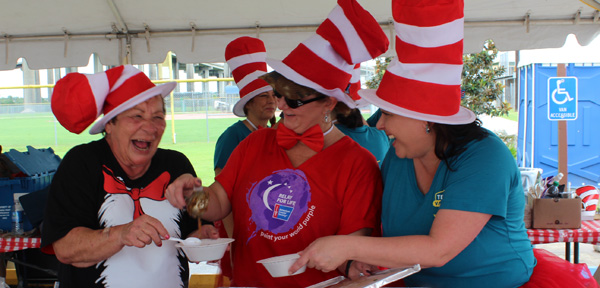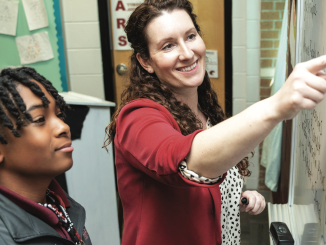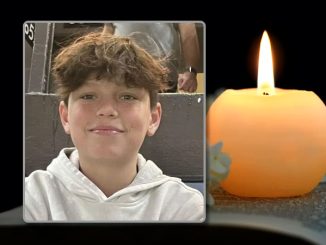
It wasn’t until Jan Landry’s name appeared on a luminary bag at the 2003 Relay for Life ceremony that her daughters learned their mother was a cancer survivor.
“It was a like a weight lifted from my heart,” said Landry, who had not spoken to her family about being a cancer survivor since she found lumps in her breasts in 1968. “My daughters and I talked about it, and I think they understood.”
Landry decided it was time to talk about it – no more taboo. It’s also the year the Boutte resident and her friend Nancy Zeringue became the co-chairs of the American Cancer Society’s Relay for Life. Last Saturday’s Relay marked their 12th year of heading the event, which was held from noon to midnight and included the Luminaria Ceremony remembering survivors and lost loved ones to cancer.
Even with rain, the event still drew hundreds of suporters.Landry kept the event focused on survivors and lost loved ones.
Her own experience as a cancer survivor convinced her it was time to live, but that’s not how it was for nearly 48 years ago when no one talked about it.
She was living in Illinois when a biopsy revealed she had stage 1 cancer. It was treated, but she was placed in a room the size of a closet for the treatments, which left her dealing with depression and shame over the illness and how it affected her.
“Your confidence is not there,” Landry said. “You feel no one will have anything to do with you because have this bad word – cancer.”
But then her uncle brought her to the hospital on the military base, where he was the commander, to visit with Vietnam veterans.
“I thought ‘You know what, I’m not going to let this beat me and here I am,’” she told herself after seeing these men without arms and legs. “It definitely woke me up. Reality really set in. I don’t have it as bad they have it.”From then on, Landry stayed committed to fighting cancer as a mother, as a fundraiser and even as a caregiver.
“I see that smile on their face when they talk about their children or their grandchildren,” said Landry, who understands that talking about their lives helps them work through the realization of having cancer. “Let them talk to you about their life. If gives you a different feeling that I’m helping them.”
The hardest moments as a caregiver is when the cancer victim is a child, Landry said. Many families are lost when a little one is affected, struggling with the unknown of whether they will die in a couple of week or months.
Landry says her role then is to help family members go to lunch or church or just take a break from the vigil.The Luminaria Ceremony is an opportunity to make peace with this intensely emotional experience, she said.




Be the first to comment